Keresés: %s
Keresés: %s
Challanges related to the promotion of energy from renewable sources, increased energy efficiency and mass e-mobility were discussed today at an informal meeting of energy ministers in Slovenia
The informal meeting of energy ministers took place in Slovenia on 21-22 September 2021, where Hungary was represented by Attila Steiner, Secretary of State for Development of Circular economy, Energy and Climate Policy from the Ministry of Innovation and Technology.
The ministers of the EU discussed the Fit for 55 package energy-related proposals, in particular the challenges coming from the increased promotion of energy from renewable sources and energy efficiency, or the issues arising from the implementation of mass e-mobility.
Given that 75% of emissions can be attributed to the energy sector, the transformation of this sector is key to achieving the 55% emissions reduction target by 2030, but the transition must be fair and affordable for everyone. The key to achieve this, according to the European Commission, is to increase annual energy savings and increase the share of renewable energy in the heating, district heating, building, transport and industrial sectors.
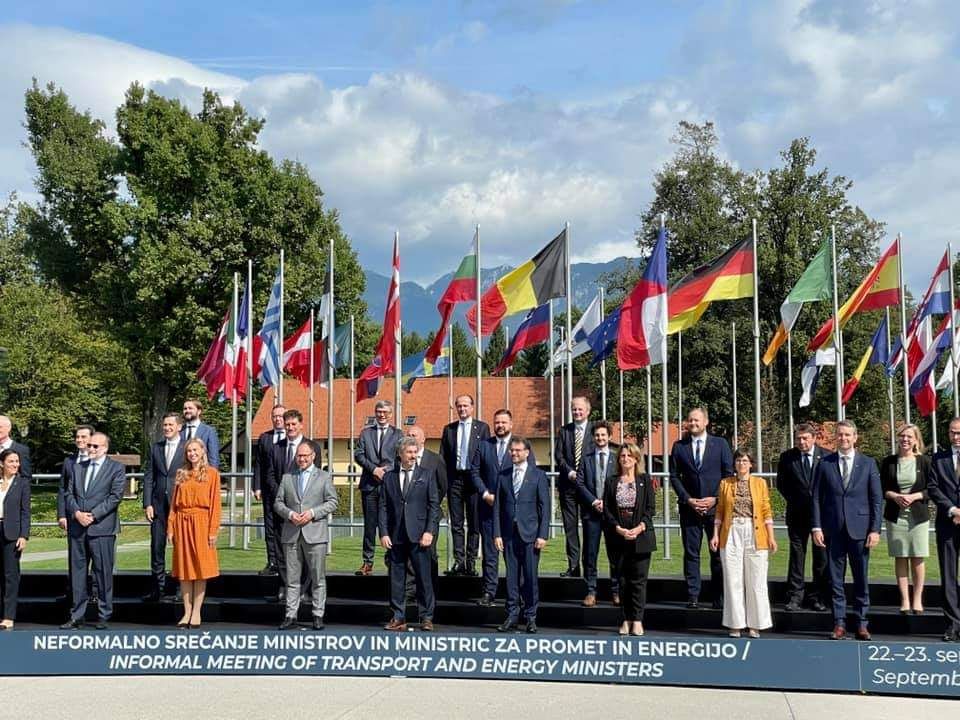
Attila Steiner confirmed that Hungary supports climate neutrality and the necessary ambitions to achieve this, however, the EU regulations must take into account the national natural, economic and social conditions. Member States need flexibility to implement emission reduction in a cost-effective way. The Commission's proposals must not lead to an increase in household energy prices.
All low-emission technologies will contribute to ensure a continuous and reliable supply of energy to the population, including nuclear energy and natural gas.
Thanks to the V4 coordination, that took place prior to the meeting, the Heads of Delegation of the V4 countries formulated a similar message to ours.
In addition, several ministers drew attention to record high energy prices and called on the Commission to address this in a coordinated manner as soon as possible.
The second session, together with the transport ministers, the promotion of electromobility and the development of the necessary alternative charging infrastructure was deliberated. The State Secretary presented the Hungarian green bus program, which we hope will make a significant contribution to reducing transport emissions.
Environment ministers endorsed the EU’s position on the upcoming 26th Conference of the Parties of the United Nations Framework Convention on Climate Change (COP26), exchanged views on the new climate package, the energy price crisis and the EU Forest Str
On October 6 2021 the environmental ministers discussed important issues related to climate policy during the Environmental Council in Luxembourg.
Member States adopted council conclusions determining the basis of the EU’s position in light of the preparation for the upcoming 26th Conference of the Parties of the United Nations Framework Convention on Climate Change (COP26), enabling the EU to present a unified EU position on the most urging international climate policy issues.
Ministers, for the first time, held a public debate on the so-called „Fit for 55” legislative package on the EU’s updated climate change policy. A number of Member States shared their concerns about the impact on citizens of the European Commission’s proposal on the introduction of emission trading for road transport and the building sector. Subsequently, Member States discussed the Union’s energy price crisis with a view to exploring the possibilities of common action.
Ministers exchanged views on the Commission’s new EU Forest Strategy for 2030. Member States signalled that the economic function of forests were given less weight in the Strategy, as well as that the document encroaches upon national competences.
EU-Western Balkans Summit - 5-6, october 2021, Brdo, Slovenia
Prime Minister Viktor Orbán and other EU leaders discussed with their Western Balkans counterparts the EU’s strategic engagement with the region.
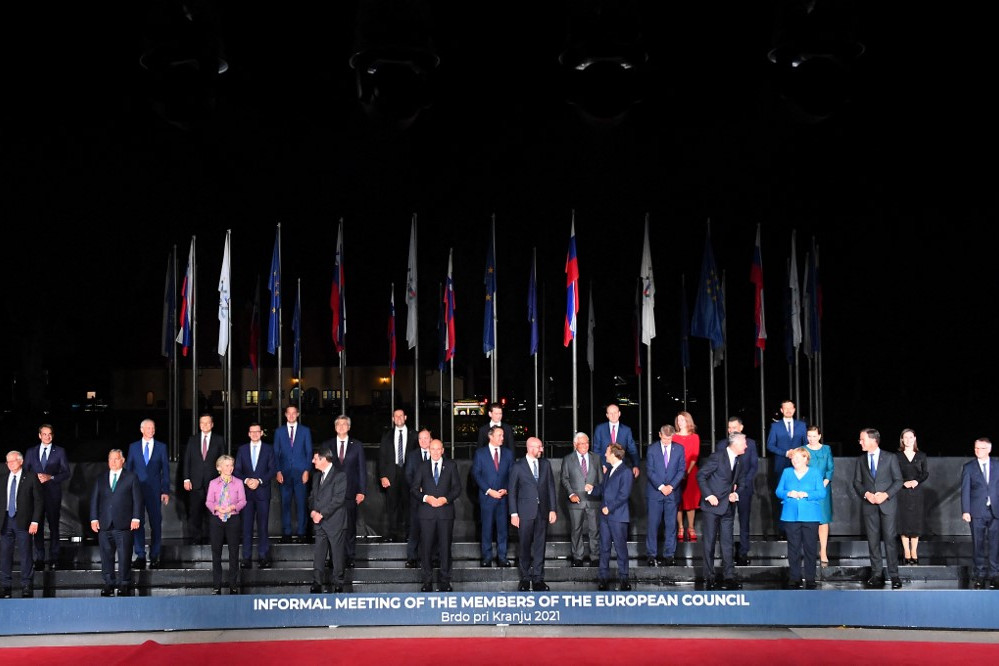 Photo: AFP
Photo: AFP
The EU leaders reconfirmed their commitment to the enlargement process of the Western Balkan countries, which is of mutual strategic interest and a shared strategic goal. Ensuring stability in the region, strengthening regional cooperation and providing assistance through a substantial investment package were also important issues. Hungary calls for tangible progress in the integration process of the Western Balkan countries.
CAP Strategic Plans, EU marketing standards, situation on the pig meat sector, the new EU Forest Strategy, the Fit for 55’ package and animal welfare were on the agenda of the October Agriculture and Fisheries Council
Ministers of Agriculture discussed the preparation of CAP Strategic Plans, the revision of EU marketing standards, including labelling honey blends, crisis situation in the pig meat sector, the new EU Forest Strategy, the Fit for 55’ package and animal welfare issues at the Agriculture and Fisheries Council held on October 11-12 in Luxemburg.
On the first day of the Council, agricultural ministers exchanged views on the preparation of CAP Strategic Plans. Delegations expressed concerns regarding the tight timeframe and the lack of legal certainty. The vast majority of member States – including Hungary – highlighted that the secondary legislation should not go beyond the political agreement. Several Member States were disappointed about the inclusion of legally non-binding Green Deal targets.
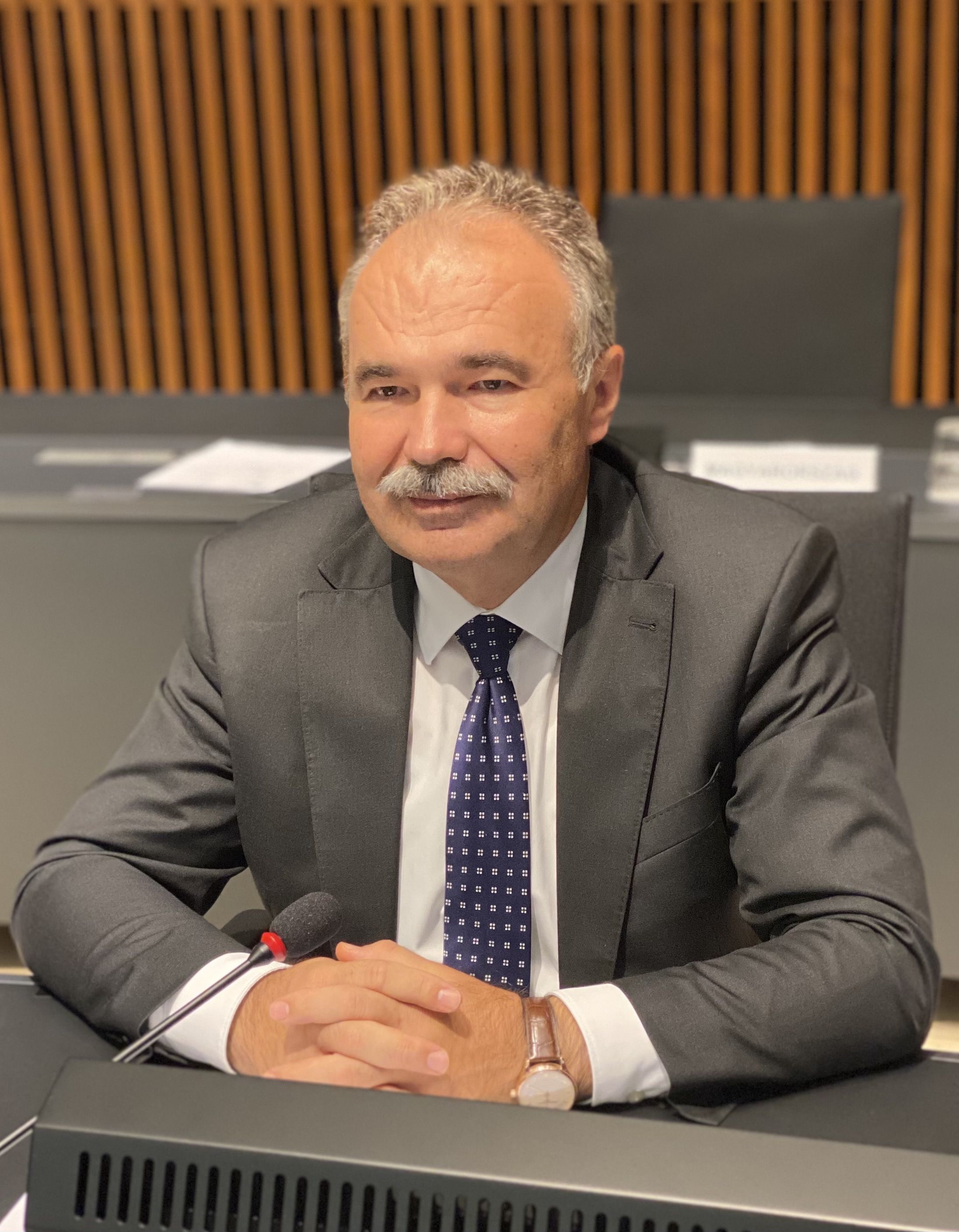
During the debate of EU marketing standards, vast majority of Member States called for stricter rules on origin labelling of honey blends to better inform consumers. The Commission has indicated its openness to review the Honey Directive.
As regards the critical situation in the pig meat sector, Hungary also joined those eighteen Member States, who asked for exceptional market measures from the Commission to handle the situation. Unfortunately, the Commissioner was reluctant to introduce the requested measures, but proposed other tools, such as the Temporary Framework for State aid, or the rural development funds.
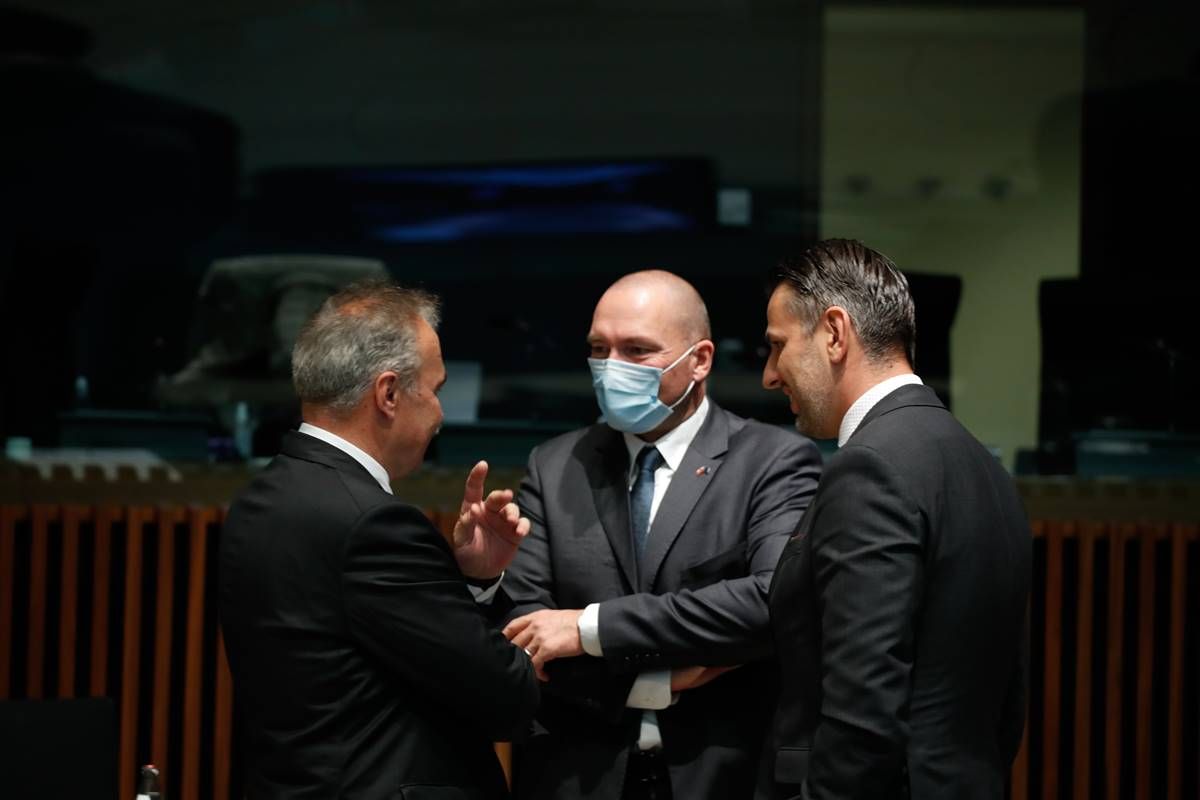
On the new EU Forest Strategy for 2030 ministers agreed that forests play a crucial role in the conservation of biodiversity and the fight against climate change. They welcomed the strategy, but stressed the importance of finding the right balance between the environmental goals and the economic and social functions of European forests. They also underlined that the national specificities must be taken into account with full respect to the subsidiarity principle. Minister István Nagy emphasized that sustainable forest management makes a significant contribution to achieve the objectives of the Green Deal and Hungary is committed in increasing wooded land and preserving existing forest areas.
As regards the agriculture and forestry aspects of the Fit for 55 climate package ministers highlighted the challenges these sectors have to face in reaching climate neutrality. They emphasized that food security should be guaranteed and competitiveness of agricultural sectors should not be jeopardized by the climate goals. Many ministers stressed that different starting points and circumstances of member states, as well as different specificities of agriculture and forest sectors should be taken into account when setting climate objectives. Minister István Nagy emphasized that the right balance should be found between maintaining the level of agricultural production, profitability of farmers and climate goals. He added that healthy food supply has a strategic importance, which should not be put at risk. Fulfilment of the climate objectives should not result in the drastic increase of food prices, which would put even higher burden for consumers and households.
Increasing the level of animal welfare were broadly agreed by ministers. On behalf of several Member States, Denmark presented specific proposals to tighten husbandry conditions for certain farm animals. Hungary, together with several Member States, called for equal requirements for imports of products of animal origin, as well as for the gradual introduction of possible new legislation, a transitional period and provision of aids.
Informal videoconference of health ministers – 12 October 2021
The informal videoconference of health ministers took place on 12 October 2021. On behalf of Hungary, Prof. Dr. Ildikó Horváth minister of state of health attended the meeting.
An integral part of the meeting was a tacking stock of the Covid-19 pandemic. Member States shared their experiences with the fourth wave and expressed the need for enhanced cooperation, to further increase the vaccination coverage of the population, given that vaccination remains the most effective tool for saving human lives and protecting communities.
The first discussion item aimed at exploring joint EU solutions to increase the accessibility and availability of medicines and to improve preparedness and response to cross-border health crises. While Hungary agrees with the objectives of the Health Emergency Response Authority there is a need for better involvement in the governance of the newly established Commission service. The EU also needs to expand its perspective and tackle supply challenges that are not directly linked to COVID. From this perspective, the upcoming Commission initiative on shortages is much awaited. Reasons of shortage are multiple; therefore actions should be equally diverse and exploit a wide range of legislative and non-legislative actions. The Slovenian Presidency identifies three important areas, namely repurposing of oncology medicines, incentivizing the development of new antibiotics, and strengthening strategic autonomy, which deserve further reflections.
The ministers exchanged views on the question of working together, investing in health and supporting the implementation of innovative solutions for resilient health systems. The participants agreed that stronger cooperation in the field of sharing of information, experiences and best practices is important in order to better plan and use available EU funds in the field of health system reforms.
At the meeting, the WHO EURO office presented the European health roadmap for the Western-Balkan, which aims at reducing health gaps between the region and the EU.
Telecom Ministers informal Council meeting on 14 October 2021
On 14 October 2020, telecoms ministers discussed issues related to the proposed regulation on artificial intelligence.
Ministers emphasized their preference for a regulation that encourages innovation and the participation of smaller economic actors, with a focus on building trust and human-centric regulation. It was emphasized that the EU could play a global leading role in setting global standards for artificial intelligence by adopting the proposal. The common goal is to ensure that the new system does not impose an excessive administrative burden, in particular on SMEs and start-ups, and to take due account of sectoral specificities, in particular for law enforcement authorities. Ministers also agreed on the need for better coordination at EU level of measures to support research, innovation and technology spread related to AI.
On behalf of Hungary, Deputy State Secretary Károly Balázs Solymár emphasized that we support the horizontal and risk-based approach. We would like to see a gradual regulation that is tailored to the size of market players and takes into account the interests of start-ups, SMEs and consumers as well.
General Affairs Council, 19 October 2021, Luxembourg
Within the framework of the Hungarian V4 Presidency, a V4 coordination meeting took place before the General Affairs Council meeting on the 19th of October. At the V4 coordination meeting and the General Affairs Council meeting, Hungary was represented by Judit Varga, Minister of Justice. At the General Affairs Council meeting, the Council was chaired by Gašper Dovžan, Slovenian Secretary of State for EU Affairs, and the Commission was represented by Commissioner Didier Reynders.
Preparation of the European Council on 21-22 October 2021
The General Affairs Council held an exchange of views about the preparation of the upcoming European Council meeting on the 21st and 22nd of October based on the draft conclusions. The Ministers focused the discussion on the Covid-19 pandemic, digitalization, migration, energy prices, trade and the external relations.
Conference on the Future of Europe
The Presidency informed about the state of play of the Conference on the Future of Europe, after the first European citizens' panels took place (https://futureu.europa.eu/assemblies/citizens-panels). All four panels have already had their inaugural sessions. The first sessions of the panels have served to identify streams and subtopics that participants will discuss in greater depth in the following sessions.
The Presidency also provided updates on the preparations for the next plenary of the Conference, which will take place in Strasbourg on 23 October (https://futureu.europa.eu/pages/plenary).
The Presidency reiterated that the Executive Board of the Conference has invited all EU citizens to contribute to shaping their own future and that of Europe as a whole on the digital platform (https://futureu.europa.eu/?locale=en). By spring 2022, the Conference is expected to reach conclusions and provide guidance on the future of Europe.
Annual Rule of Law dialogue
In the framework of the annual rule of law dialogue, Ministers held a further horizontal discussion after one year on the basis of the Commission’s second Annual Rule of Law Report, which was issued on 20 July 2021. According to the orientated topical reference suggested by the Slovenian Presidency the debate aimed at focusing especially on the role and functioning of the institutional checks and balances during the COVID-19 crisis.
The country-specific discussion on the rule of law situation in certain Member States, organised every six months at the General Affairs Council, will take place in November with hearings of the upcoming five Member States (Croatia, Italy, Lithuania, Latvia and Cyprus).
Conference on the occasion of the Day of Remembrance for the Victims of Totalitarian Regimes
Slovenia informed the Ministers about the international conference held on the 23rd of August in Slovenia on the occasion of the Day of Remembrance for the Victims of Totalitarian Regimes.
Foreign Affairs Council, 21 October 2021, Luxembourg
Hungary was represented by Péter Szijjártó, Minister of Foreign Affairs and Trade at the Foreign Affairs Council held in Luxembourg on 21 October 2021. The meeting of the Council was preceded by a breakfast discussion with the Libyan Minister of Foreign Affairs, Najla El Mangoush, at the invitation of Nikos Dendias, Minister of Foreign Affairs of Greece.
The Council had an in-depth, strategic discussion on the Gulf region. The ministers agreed that the countries in the region are key economic partners of the EU, have a crucial role in the security in the wider Middle-East region, and share common interests with the EU concerning global issues. Minister Szijjártó underlined that the conclusion of the Abraham Accords is an important milestone for the stability of the region.
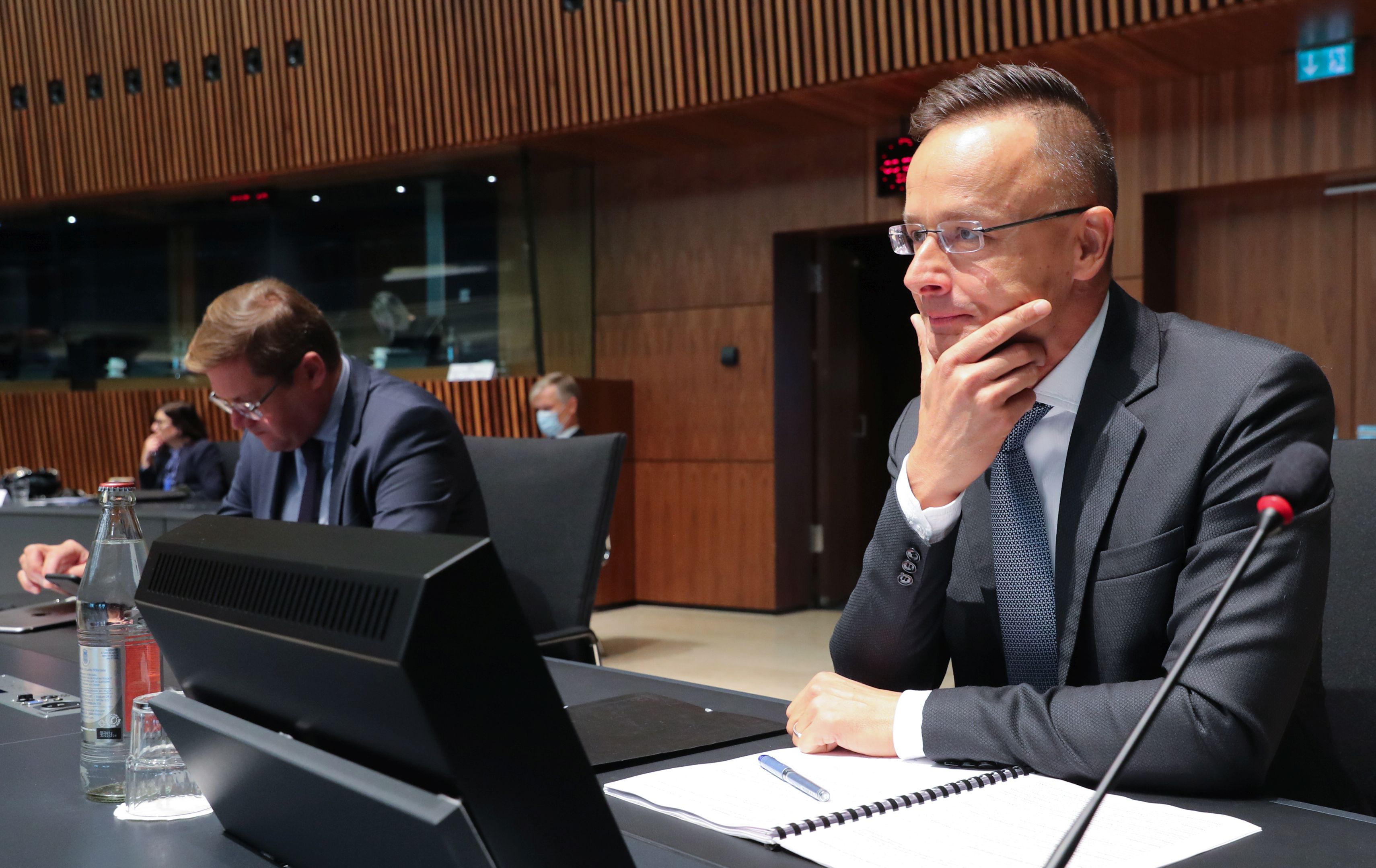
source: consilium.europa.eu
The ministers had an exchange of view on the Eastern Partnership with a view to preparing the upcoming EU-Eastern Partnership Summit. Minister Szijjártó emphasized the pressing need to diversify energy sources of the EU, referring to Hungary’s long-term gas supply agreement concluded with Russia recently. High Representative/Vice President Josep Borrell confirmed that the agreement was fully in line with European Union law, despite Ukrainian claims to the contrary.
The Council had an exchange of views on the situation in Nicaragua and in Ethiopia. In the context of the latter, Minister Szijjártó drew attention to the crucial role Egypt plays in stemming illegal migration flows headed for Europe, including from the Horn of Africa region.
Under current affairs the Council discussed Afghanistan, Libya, Tunisia, Mali, Varosha, COP26 preparations, the Western Balkans region, and Belarus. Minister Szijjártó welcomed the High Representative/Vice President’s plan to include strategic discussions on the geopolitics of climate and energy, and also on the Western Balkans on the agenda of the Foreign Affairs Council’s next meeting. Hungary’s unconditional support for Poland and Lithuania in their efforts to deal with the illegal migration pressure faced on their borders with Belarus was confirmed.
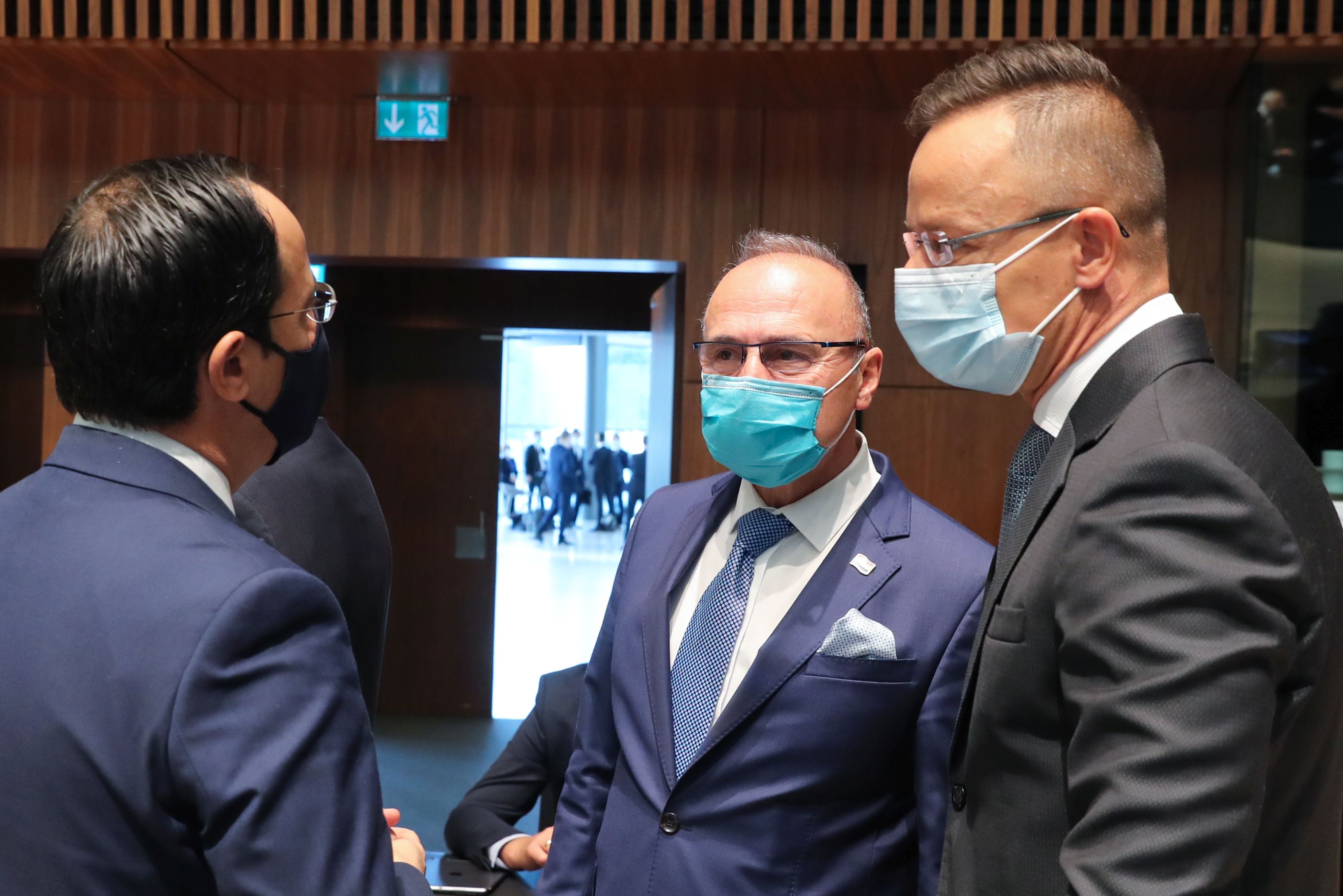
source: consilium.europa.eu
Extraordinary Energy Council meeting, 26 October 2021.
At the extraordinary meeting of the Energy Council in Luxembourg, ministers exchanged views on the impact of rising energy prices and possible measures at national and EU level.
Member States generally welcomed the Commission’s toolbox which sets out short- and medium-term measures to handle the hiking energy prices. Ministers agreed that supporting vulnerable households and tackling energy poverty is a priority. At the same time, Member States reaffirmed their commitment to continue the energy transition, which in the long run will allow for independence from fossil imports exposed to global market developments through renewable energy and other low-carbon energy sources.
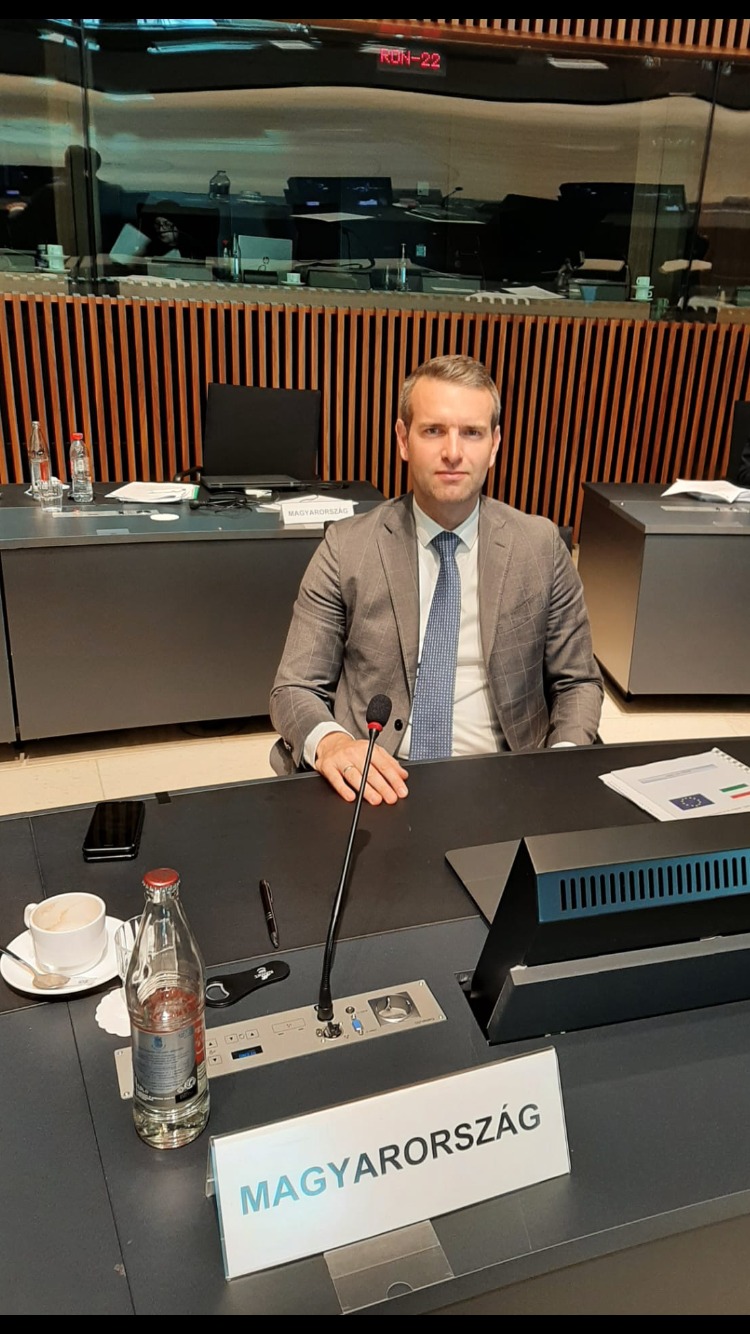
Hungary was represented at the meeting by Attila Steiner, Secretary of State for Circular Economy Development, Energy and Climate Policy at the Ministry of Innovation and Technology. He highlighted the gravity of the situation, as companies face higher energy bills at a time when many companies lost their revenues due to the pandemic. Together with several Member States, he called for tangible, swift and effective action by the Commission in order to guarantee affordable energy prices both for citizens and businesses, emphasizing that without finding a solution we will risk losing the public support from behind the green transition.
Together with Hungary, several Member States have called on the Commission to present its proposal on sustainable financing, the so called Taxonomy Delegated Act, covering nuclear energy and natural gas investments as soon as possible, as without these technologies, emission reduction objectives cannot be realistically achieved.
Meeting of the Foreign Affairs Council (Trade), 11 November 2021
The meeting of the Foreign Affairs Council (Trade) took place in Brussels on 11 November 2021. The Hungarian delegation was led by H.E. Tibor Stelbaczky, Permanent Representative of Hungary to the EU.
The Council reviewed the state of play regarding the preparation of World Trade Organization (WTO) 12th Ministerial Conference (MC12), which will take place from 30 November to 3 December 2021 in Geneva. Hungary considers it crucial to preserve the multilateral trading system and we are committed to the comprehensive reform of the WTO.
Ministers took stock of the state of play and latest developments in the EU-US trade relations, including the advancement of the positive agenda, the Trade and Technology Council and progress made towards the resolution of bilateral disputes. Hungary supports the strengthening of EU-US trade relations and welcomes the recent positive developments. At the same time, it is important to find long term negotiated solutions for our remaining conflicts in line with EU’s economic interests.
Under “Any Other Business”, Executive Vice President Dombrovskis presented the annual report on the implementation of EU trade agreements. The Council received information on the ongoing review of the EU’s approach on Trade and Sustainable Development chapters in trade agreements. During the working lunch, ministers received an overview of the state of play of bilateral trade negotiations, focusing on Chile and New Zealand.
After the formal part of the Council meeting, ministers had an opportunity to exchange views with the United States Trade Representative, Katherine Tai on bilateral trade relations, WTO reform and expectations for MC12.
Agreement on the EU budget for 2022, 12-15 November 2021
The Council has reached an agreement with the European Parliament on the 2022 EU budget on the conciliation committee meeting of 15 November after the Member States highlighted their priorities on the public session of the Ecofin budget on 12 November. The agreement is for commitments of €169.5 billion, and payments of €170.6 billion. While next year’s budget strongly reflects the EU’s main priorities: economic recovery, fighting climate change, and the green and digital transitions, it also guarantees sufficient resources for cohesion policy and common agricultural policy. It also leaves enough resources under the expenditure ceilings of the 2021-2027 multiannual financial framework to allow the EU to react to unforeseeable needs.
From the Hungarian point of view it has to be underlined, the expenditures of the cohesion and common agricultural policies were secured during the whole budgetary negotiation process. Their amount corresponds to the level included in the Council position, supported by Hungary as well, taking into account the amending letter.
The Council and the European Parliament now have 14 days to approve the joint text. The Council is expected to approve it on 23 November and the vote in Parliament’s plenary, which will mark the end of the process, is currently scheduled for 24 November 2021.
The full breakdown per heading is available here:
|
EU budget 2022 (million euro, current prices): |
|
|
|
APPROPRIATIONS BY HEADING |
Budget 2022 |
|
|
Commitments |
Payments |
|
|
1. Single Market, Innovation and Digital |
21,775.1 |
21,473.5 |
|
2. Cohesion, Resilience and Values |
56,039.0 |
62,052.8 |
|
— Economic, social and territorial cohesion |
49,708.8 |
56,350.9 |
|
— Resilience and Values |
6,330.2 |
5,701.8 |
|
3. Natural Resources and Environment |
56,235.4 |
56,601.8 |
|
Market related expenditure and direct payments |
40,368.9 |
40,393.0 |
|
4. Migration and Border management |
3,091.2 |
3,078.3 |
|
5. Security and Defence |
1,785.3 |
1,237.9 |
|
6. Neighbourhood and the World |
17,170.4 |
12,916.1 |
|
7. European Public Administration |
10,620.1 |
10,620.2 |
|
Thematic special instruments |
2,799.2 |
2,622.8 |
|
Total appropriations |
169,515.8 |
170,603.3 |
New EU Forest Strategy, contingency plan, pig meat sector and CAP Strategic Plans were on the agenda of the November Agriculture and Fisheries Council
The agriculture ministers adopted council conclusions on the new EU Forest Strategy 2030, exchanged views on contingency plan and market situation, the current crisis in the pig sector. Hungary presented the joint declaration of V4 + 3 on the CAP Strategic Plans at the Agriculture and Fisheries Council, held on November 15 in Brussels.
Agriculture ministers adopted council conclusions on the new EU Forest Strategy 2030. Member States welcomed the balanced vision between the pillars of sustainable forest management. They also underlined that national specificities must be taken into account with full respect to the subsidiarity principle. Hungary also supported the adoption of the Council conclusions, Minister István Nagy emphasised that our priority is to preserve the existing forest areas and to increase wooded land. Minister Nagy drew attention to the economic and social aspects of forests, but also stressed the importance of Member States’ competence.
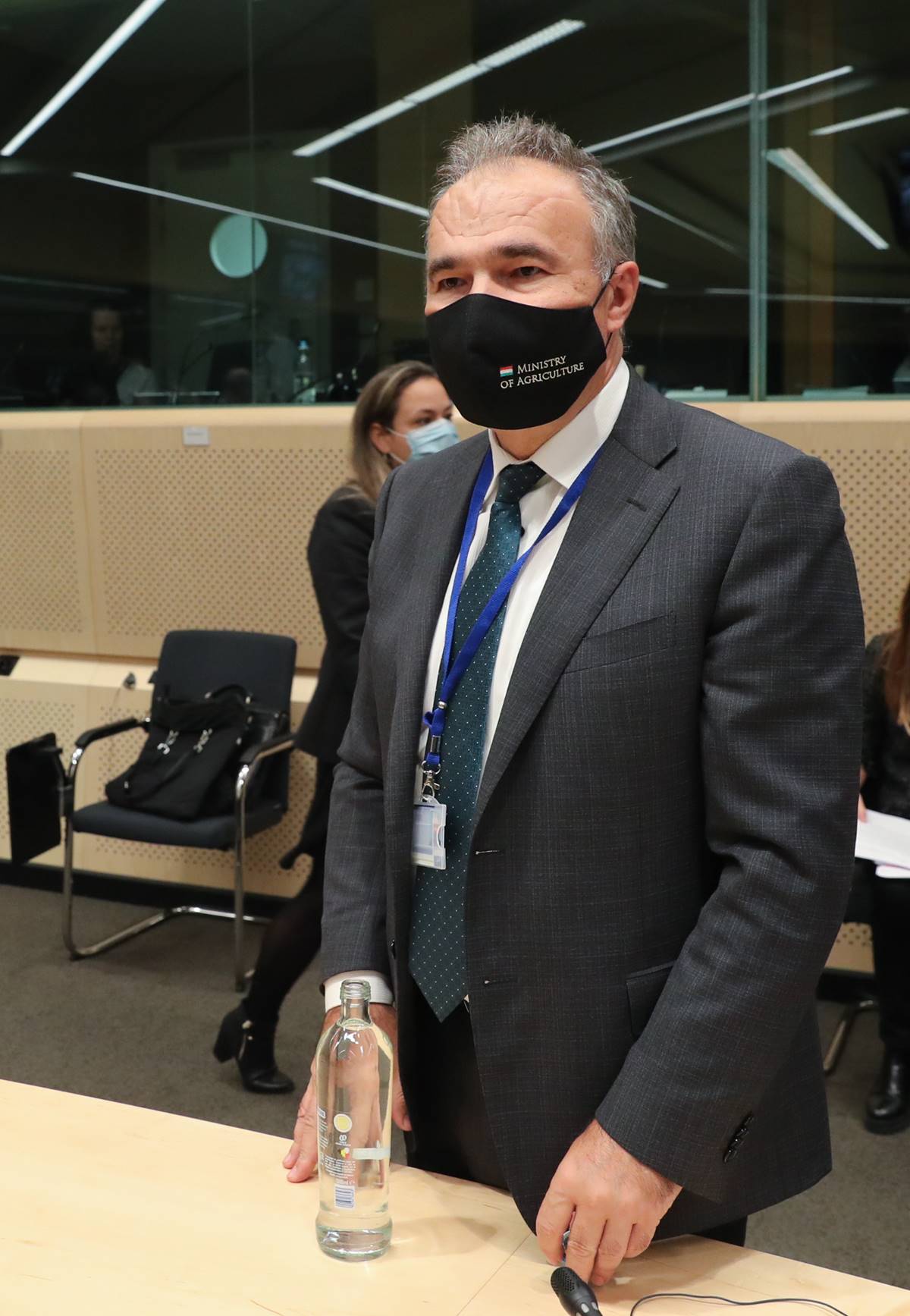
The Commission presented the communication on the contingency plan for food supply and food security. The document published on 12 November acknowledges the overall resilience of the EU food supply chain, identifies existing shortcomings, and puts forward actions to improve preparedness at EU level, in line with the Farm to Fork Strategy.
As regards the critical situation in the pig meat sector, vast majority of Member States – including Hungary – urged again the Commission to propose exceptional market measures to handle the situation. Unfortunately, the Commissioner rejected the Member States call to introduce the requested measures.
Hungary presented the joint declaration on the CAP Strategic Plans, which was signed by the Visegrád Group and Bulgaria, Romania, Croatia on 8th of October in Budapest. The declaration invites the Commission to adopt the secondary legislative acts as soon as possible, highlights that the adoption procedure of the CAP Strategic Plans should be fair, objective and transparent. They also call upon the Commission that the approval decision should be exclusively based on acts, which are legally binding on Member States. Minister István Nagy also highlighted the importance of making sure that the New Delivery Model does not create increased administrative burden. Delegations expressed concerns regarding the tight timeframe and the lack of legal certainty and fully supported that only legally binding requirements can be enforceable on Member States.
V4 Seminar on the Digital Transformation of the Health Systems
In the framework of the Hungarian V4 Presidency, the Permanent Representation of Hungary to the EU organized a seminar on the digital transformation of the health systems on 23 November 2021. In the half day seminar Hungarian, Czech, Slovak and Polish experts, researchers and companies presented their best practices and efforts in this field as well as expressed their expectations for the upcoming European legislation on the European health data space.
In his opening statement H.E. Gábor Baranyai Deputy Permanent Representative of Hungary stressed that digitalisation plays a key role to increase the resilience of healthcare systems and to provide better care for patients. The COVID pandemic resulted in a digital switch in society and the acceptance of IT tools and solutions has increased in all areas of life, including health.
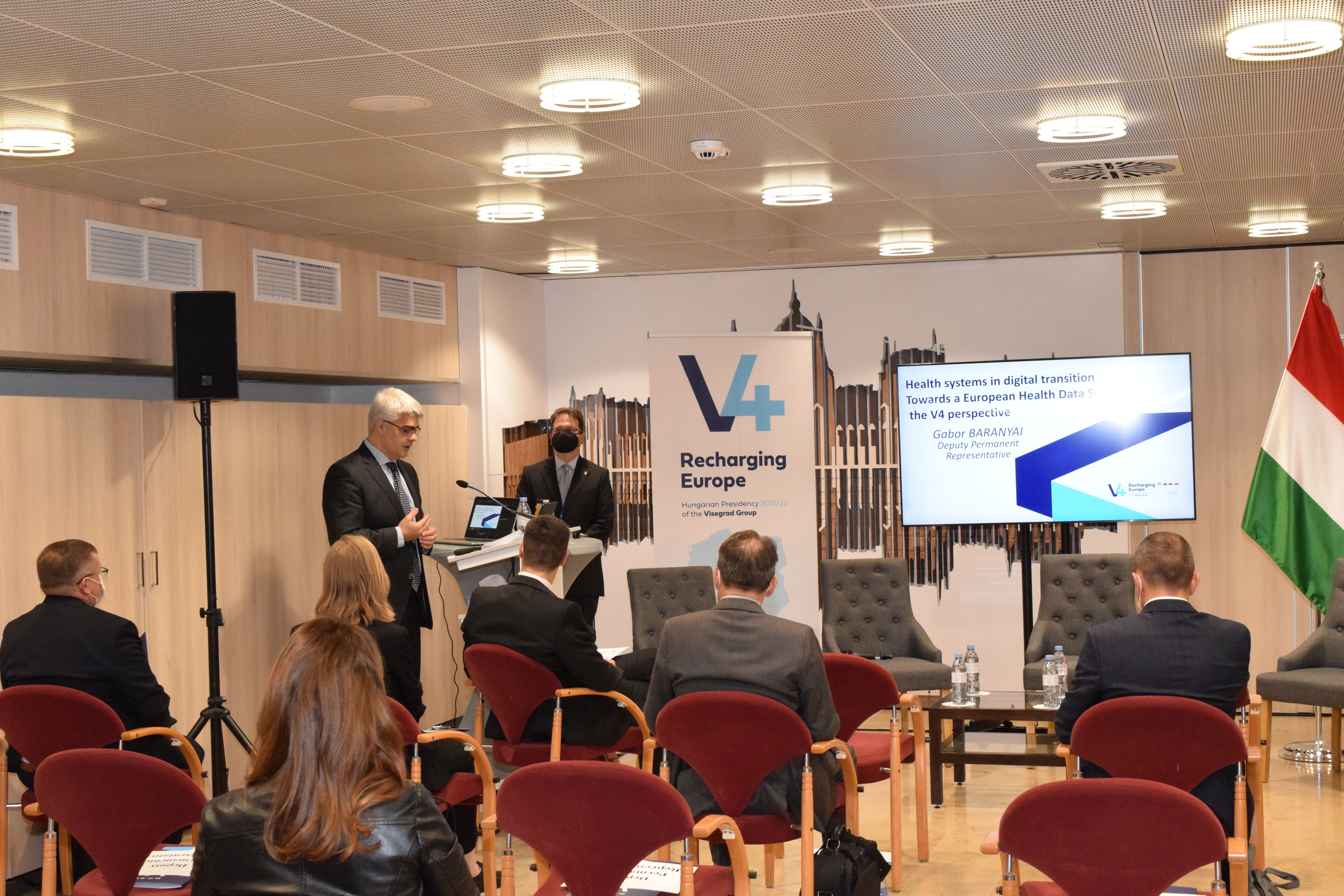
Therefore, the preparatory work leading to the creation European Health Data Space has been followed with great interest in the Visegrád Group, and we are looking forward to the upcoming legislative proposal of the Commission.
The participants concluded that secure data sharing, secondary use of data, artificial intelligence and high quality digital services may increase not only patient empowerment and improve care, but also contributes to research and innovation as well as higher quality of policy making.
However, the economic differences among the Member States should be taken into consideration and it must be ensured that all Member States can benefit equally from digitalization. To reach this goal, a proper mechanism should be elaborated otherwise only the big tech companies will benefit from the developments.
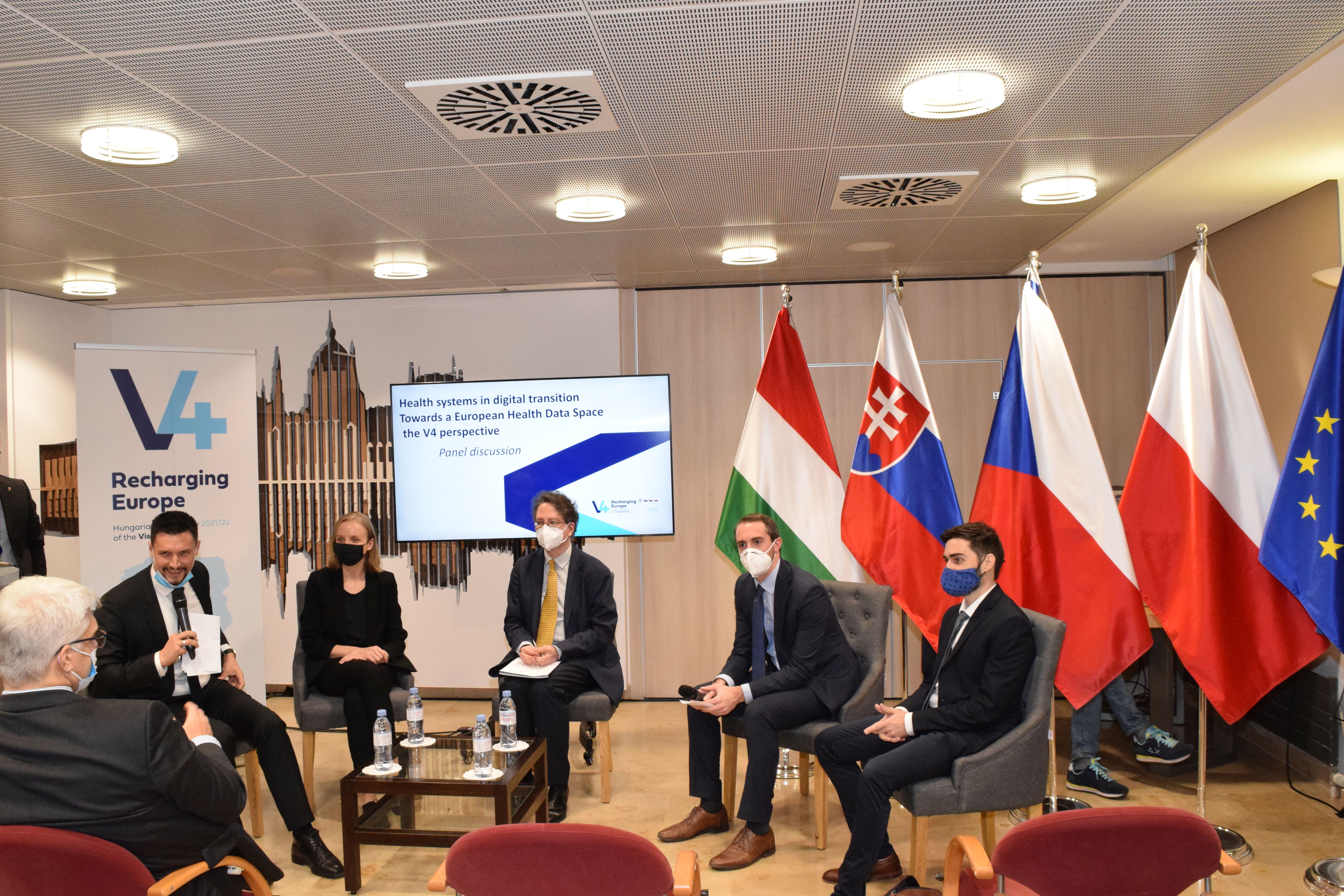
With regard to the upcoming legislation on the European Health Data Space the representative of the European Commission emphasized that the new legal framework has to ensure accessibility and secure data sharing while a single market of data should be established. The new legislation will fit into the horizontal data protection legislation of the European Union.
The programme and the presentations are available at the website of the Permanent Representation clicking here.
General Affairs Council, 23 November 2021, Brussels
At the General Affairs Council meeting on the 23rd of November 2021, Hungary was represented by Secretary of State Oszkár Ökrös. The Council was chaired by Gašper Dovžan, Slovenian Secretary of State for EU Affairs, and the Commission was represented by Vice-President Maroš Šefčovič and Commissioners Olivér Várhelyi and Didier Reynders.
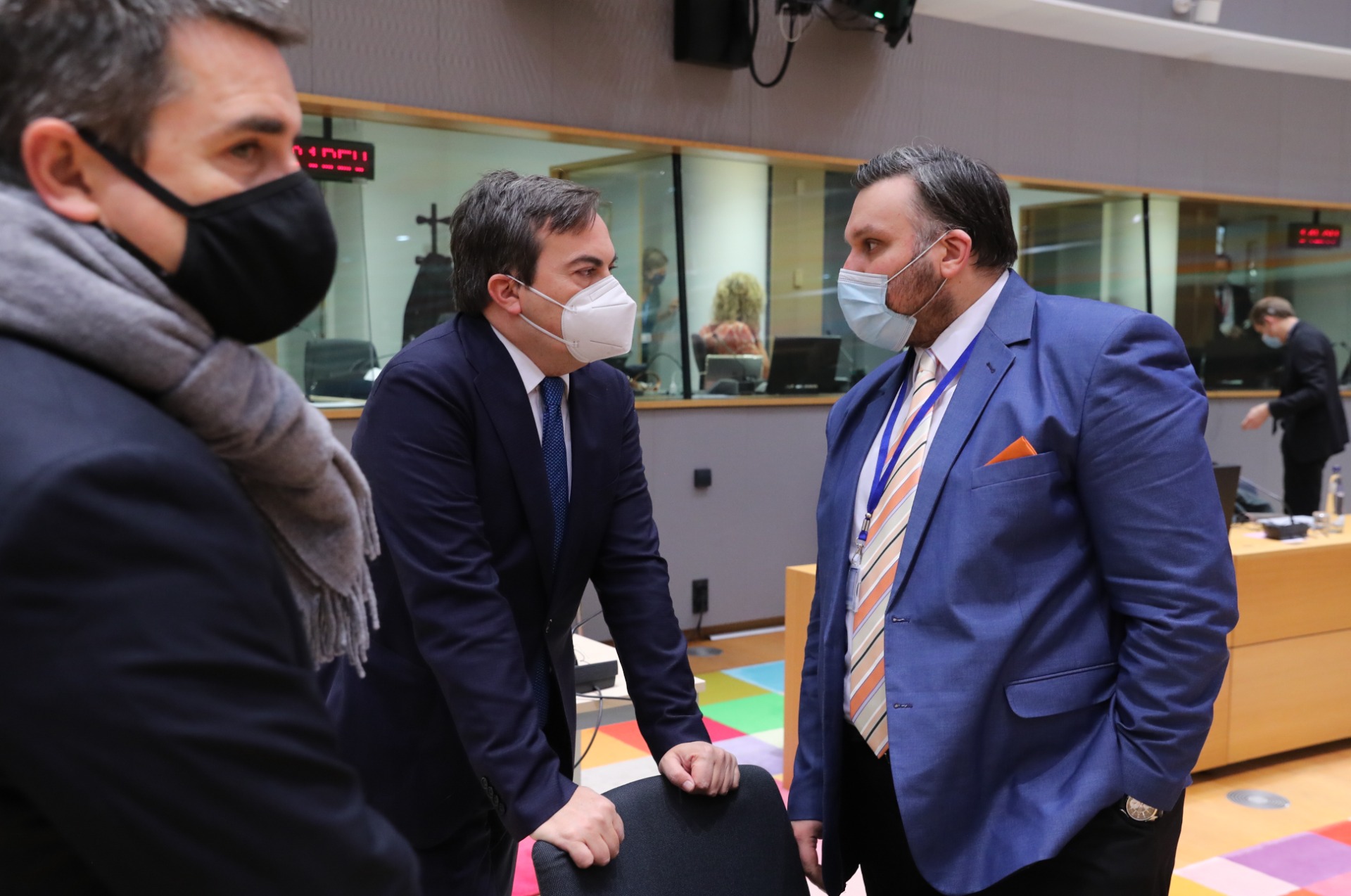
Preparation of the European Council on 16-17 December 2021
The General Affairs Council held an exchange of views about the preparation of the upcoming European Council meeting on the 16th and 17th of December based on the Annotated Draft Agenda. The Ministers focused the discussion on the Covid-19 pandemic, energy prices, crisis management and resilience, security and defence, and external relations.
Conclusions on enhancing preparedness, response capability and resilience to future crises
The General Affairs Council approved conclusions on enhancing preparedness, response capability and resilience to future crises. The conclusions highlight that the EU must be ready to face crises of different nature in the future, which will require cooperation and coordination between Member States.
Enlargement and Stabilisation and Association process
Ministers took stock of the state of play and held an exchange of views on the enlargement and stabilisation and association process with a view of possible steps to take the enlargement process forward.
EU-UK relations
On the basis of Commission Vice President Maroš Šefčovič’s update, the General Affairs Council discussed the state of play of the EU-UK relations. The debate primarily focused on the ongoing discussions with the United Kingdom on possible joint solutions to the difficulties identified by Northern Irish businesses and citizens related to the implementation of Withdrawal Agreement’s Protocol on Ireland/Northern Ireland. Member States supported the Commission’s approach to seek, as soon as possible, pragmatic solutions within the Protocol and confirmed their commitment to maintaining unity among Member States.
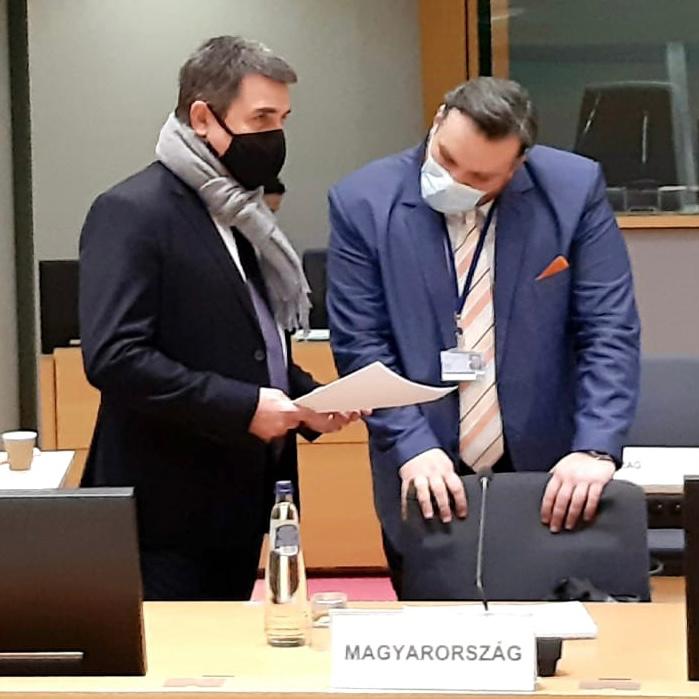
Annual rule of law dialogue: country-specific discussion
In the framework of the annual rule of law dialogue, the General Affairs Council held a country-specific discussion on the rule of law situation in the following five Member States: Croatia, Italy, Lithuania, Latvia and Cyprus.
Legislative Programming: Commission's work programme for 2022
The Commission presented its work programme for 2022 in a public session, which will contribute to the development of the joint declaration on legislative priorities for 2022 that will be agreed by the three institutions later this year.
V4 Seminar on Health systems in digital transition - presentations
Peter Lukáč: National Perspectives to Digital Health Space
Akos Tenyi: Artificial intelligence and secondary use of health data
Zdeněk Gütter: Activities on artificial intelligence in the Czech healthcare
Michele Calabro: Patients’ Perspective on the EHDS
Ministers agreed on game changer rules for digital markets
The meeting of Ministers responsible for competitiveness (industry, single market, research and space) took place in Brussels on 25-26 November 2021, where Hungary was represented by László György, State Secretary for Economic Strategy and Regulation and József Bódis, State Secretary for Higher Education, Innovation and Vocational Education from the Ministry of Innovation and Technology.
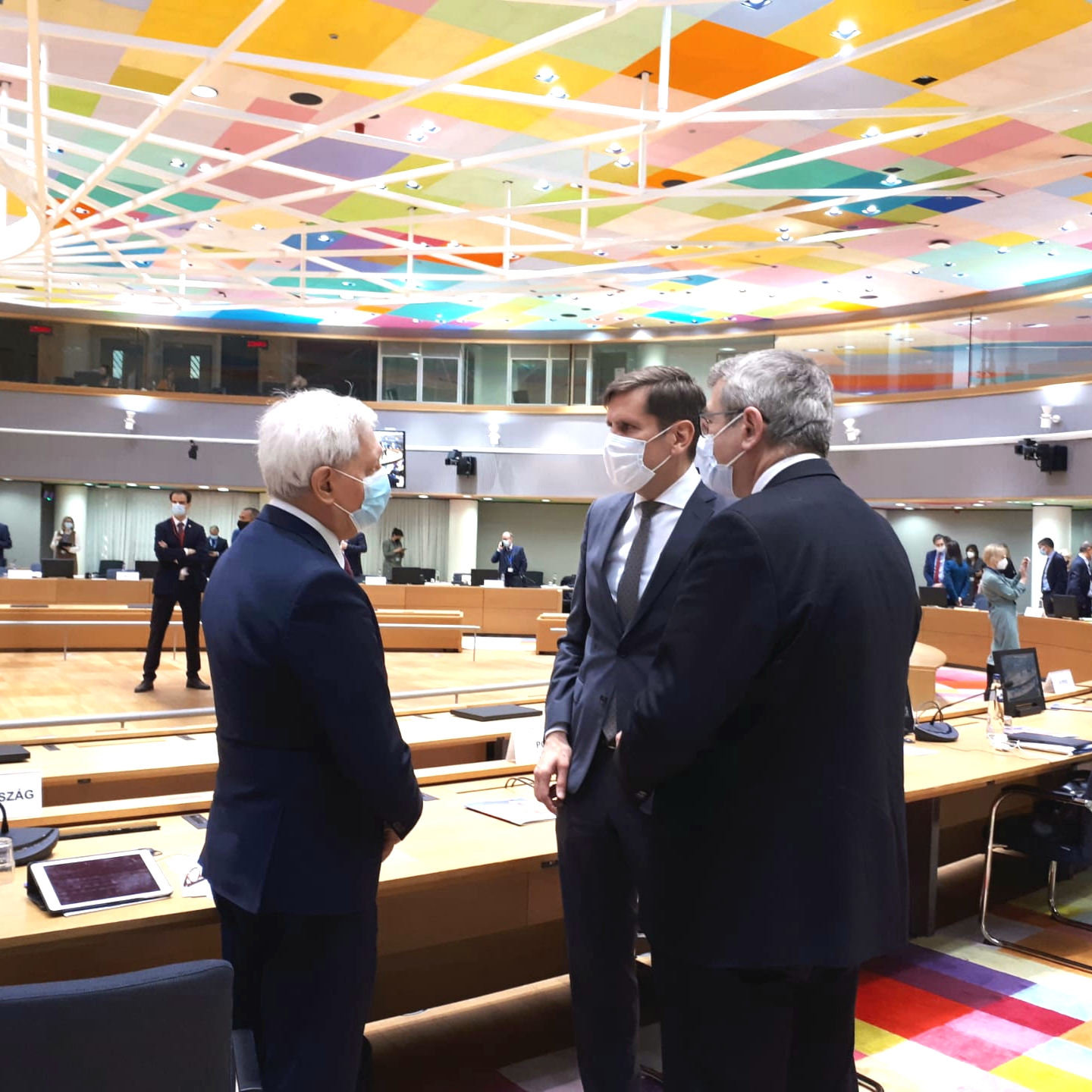
On the first day, the ministers sealed the general approach on the Digital Markets Act and the Digital Services Act. These proposals could be real game changers in terms of the regulation of BigTech companies. The EU has a historic opportunity to guarantee freedom of expression and protection against very large online platforms’ abusive practices and to ensure fair and contestable markets that benefit all.
Subsequently, the ministers discussed the state of play as well as the challenges of the implementation of the Recovery Plan for Europe. State Secretary László György, while confirmed Hungary’s support for the European recovery and resilience efforts, he denounced the slow and controversial evaluation process of the Hungarian plan (which is still waiting for approval by the Commission). In order to start preparing the investments and reforms foreseen in our national plan, the government established a National Recovery Fund (to be financed from the national budget), he added.
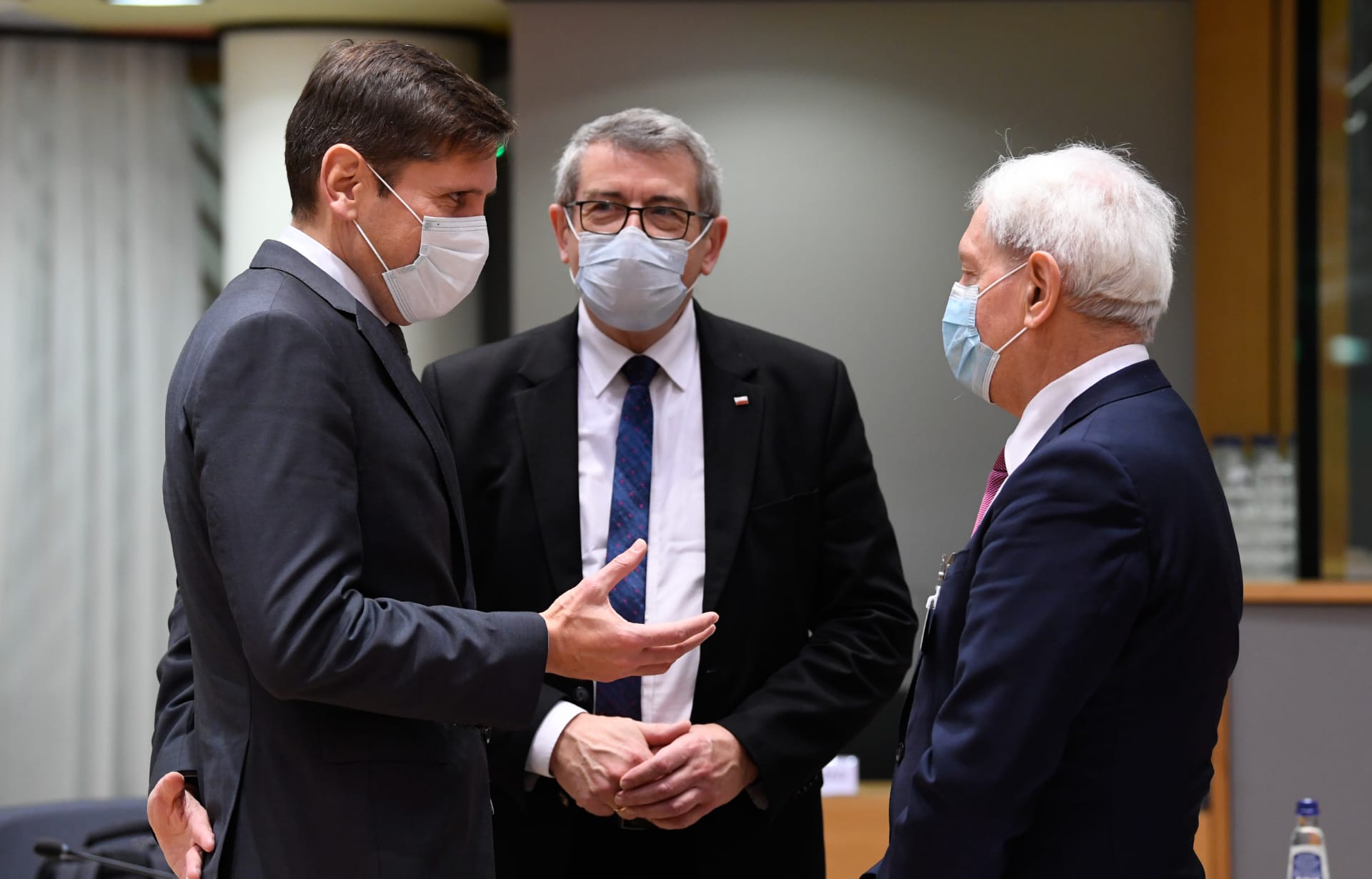
On the second day of the Council meeting, research ministers agreed on two important pillars of the new European Research Area (ERA) by the approval of the Council Conclusions on the future governance of ERA and the Pact for Research and Innovation. The latter sets out the common values and principles of the ERA, including common priorities, investments, coordination and monitoring. The Council conclusions reaffirm the Council’s role as policy maker and recognize the central role of the ERA Forum, in the coordination of the implementation of the ERA.
The ministers exchanged views on the role of Research and Innovation (R&I) in the cross-sectoral objectives. They highlighted the pivotal role of R&I in solving complex societal challenges, requiring increased cross-sectorial coordination and synergies between various policy fields, basic research and innovation, industry’s and society’s needs. State Secretary Prof. Dr. Bódis stressed that the R&I policy does not only have a serving role, but it also has independent priorities and the proper strategic planning of Horizon Europe is very important. He highlighted that the governmental cooperation is also extremely important, because it allows Member States to plan the effective use and combination of different resources in the implementation of the green and digital transition. He underpinned that coordination at government level also allows Hungary to properly inform R&I actors.
The Council ended with a meeting of the Space Policy Section, where participants discussed the long-term sustainability, sustainable development and financing of the "New Space" and reaffirmed their commitment to supporting new emerging private sector players in the space sector.
Education, Youth, Culture, Sport Council, 29 - 30 November 2021
Dr. Zoltán Maruzsa, Minister of State for Public Education represented Hungary in the meeting of the Education, Youth, Culture, Sport Council, 29 – 30 November 2021.
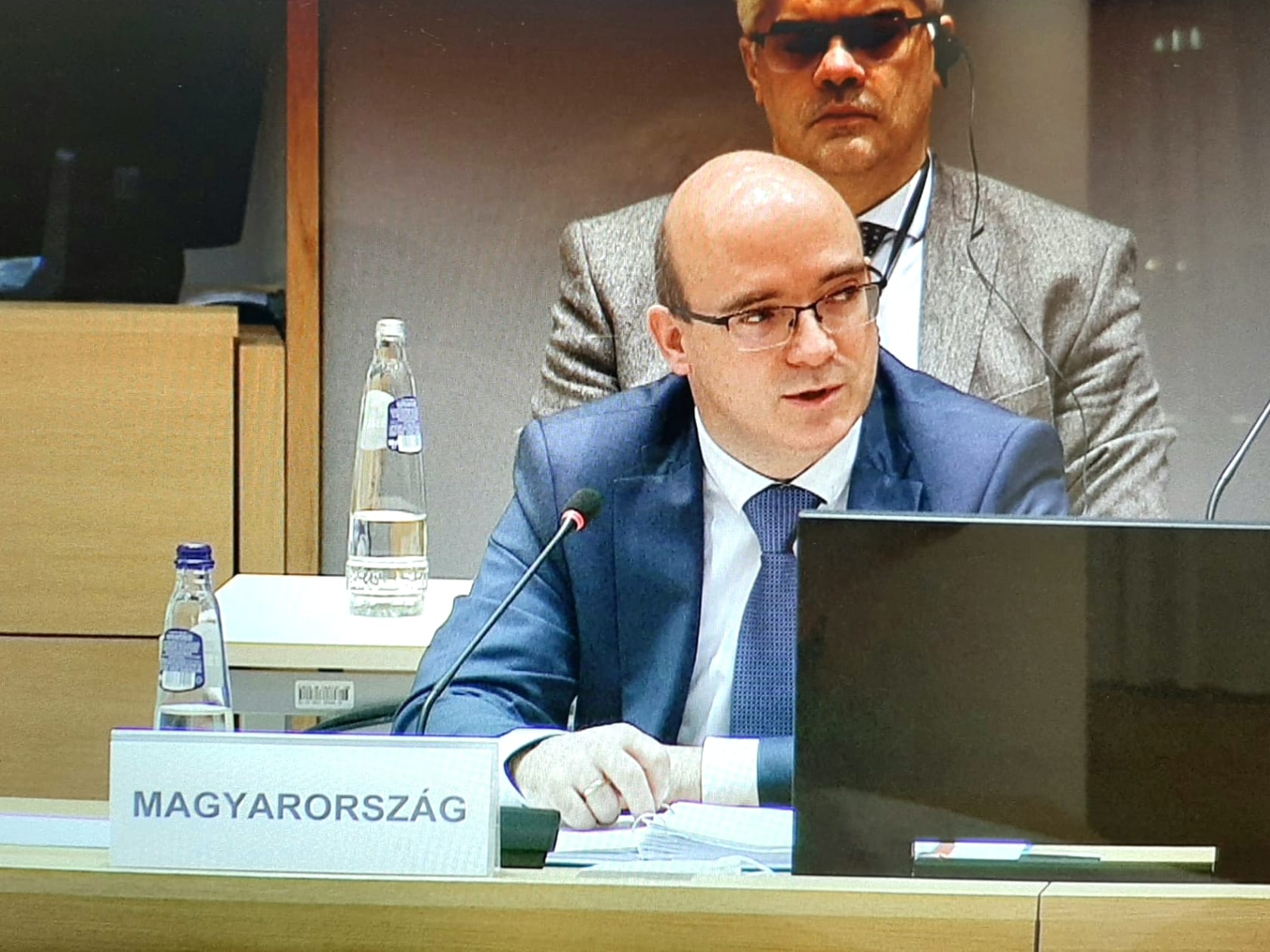
Building on the lessons of the period when schools switched to digital education because of the pandemic in most EU countries, the Council adopted a recommendation on blended learning approaches for high-quality and inclusive primary and secondary education. As a contribution to the structured dialogue for the implementation of the European Digital Education Action Plan education ministers discussed about the improvement of digital education and skills. A resolution on a new 10 years European agenda for adult learning encourages education and training opportunities for adults, while another resolution lays down the governance structure of the strategic framework for European cooperation in education and training towards the European Education Area and beyond (2021-2030).
It is a great honour that the Council designated Dr. Tünde Szabó, Minister of State for Sport of Hungary as a representative of the EU Member States at the World Anti-Dopping Agency (WADA) Foundation Board, for a period of three years running from 1 January 2022 until 31 December 2024.
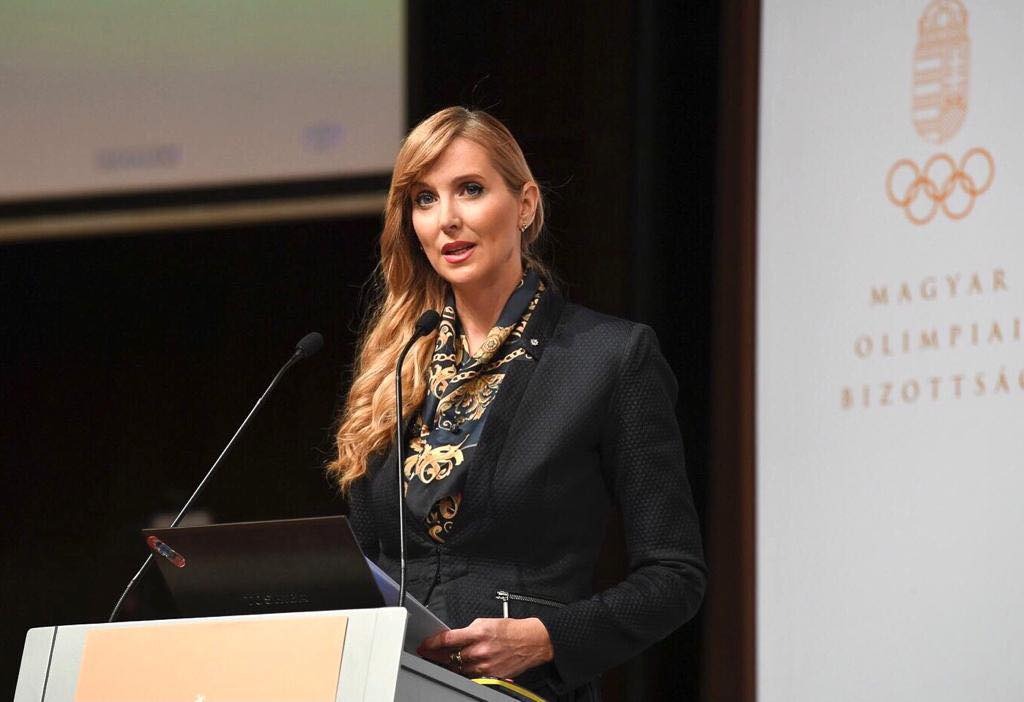
Youth Ministers held a debate about the importance of protecting and promoting civic spaces for young people and the measures to facilitate this. These civic spaces, which allow young people to participate meaningfully in society, in decision-making and in shaping policies that affect them, are under increasing pressure. Ministers also voiced concerns about the role of digital tools and for a, which - although allowing young people to mobilise, raise awareness and share information - also entail risks such as intimidation, online censorship and digital surveillance.
The Council adopted a resolution on the findings of the 8th cycle of the EU Youth Dialogue to ensure greater transparency in stakeholder involvement and follow-up. Ministers adopted conclusions on the implementation (2019-2021) of the EU Youth Strategy (2019-2027) and a resolution of the EU Youth Strategy Work Plan for the period 2022-2024.
On 30 November, culture ministers discussed about cultural heritage and heritage rights, in the context of sustainable development in and outside Europe. Hungary considers the protection of cultural heritage a priority. The Hungary Helps Programme has launched cultural heritage protection projects in 27 countries, worth around €50 million. Hungary also supported the adoption of the Council conclusions on culture, high-quality architecture and built environment as key elements of the New European Bauhaus initiative. In view of the post-COVID recovery, as well as the green and digital transition, we find the adoption of the Council conclusions on increasing the availability and competitiveness of European audiovisual and media content a timely and important step, which will contribute to the promotion of cultural diversity, too.
The Council adopted a resolution on the key features of a European Sport Model and conclusions on lifelong physical activity. Finally, sport ministers discussed about how to support athletes' dual careers.
Energy ministers discussed hiking energy prices and provided policy guidance for the renewable energy and energy efficiency Directives
At the meeting of the Energy Council on 2 December 2021, Hungary was represented by Secretary of State Attila Steiner.
At the Council, the director of the Agency for the Cooperation of Energy Regulators (ACER) presented its preliminary report on the functioning of the wholesale energy market in the context of energy price volatility, the main findings of which were generally supported by ministers. Member States also presented their national measures to deal with high energy prices.
In his speech, Secretary of State Steiner emphasized that for Hungary the affordability of energy has been a priority for the Government for many years. Affordability and security of supply should also be taken into account when considering medium- and long-term measures. The current situation shows that all low carbon technologies will be needed, so he advocated for the recognition of nuclear energy as sustainable energy source and outlined the transitional role of natural gas. He presented the declaration signed by V4 Energy Ministers on this subject on 18 November. He welcomed the fact that in the final report, ACER will address options for protecting consumers from excessive price volatility.
During the policy debate on the Renewable Energy and Energy Efficiency Directives, ministers generally supported the increased ambition, acknowledging the contribution of renewable energy and energy efficiency to achieving the 55% emission reduction target. At the same time, they called for more flexibility to meet the overall national target. Together with Hungary, several delegations underlined the different starting points, different climatic and economic conditions of member states, and advocated for a fair and just energy transition.
Finally, the Commission provided information on current developments in external energy relations and presented its sixth report on the state of the Energy Union.
Meeting of the Telecom Council, 3 December 2021
The Telecommunications Council held on 3 December unanimously supported the general approach on the Directive on measures for high common level of cybersecurity across the Union and thus agreed to the launch of the trilogue process.
The Council reviewed the progress on the regulation establishing harmonized rules for artificial intelligence (AI), the regulation on the framework for a European Digital Identity and the decision on the Path to the Digital Decade. Numerous ministers welcomed the work done by the Presidency and stressed the need for future regulation not to hamper innovation or increase administrative burdens.
The Presidency briefed ministers on the successful conclusion of negotiations with the European Parliament on the data governance act and on the state of play of negotiations on a roaming regulation, as well as the progress made on the ePrivacy regulation. Several ministers expressed its views, stressing the importance of concluding negotiations with the European Parliament by the end of this year and highlighting the issues still to be resolved.
Ministers held an exchange of views on digital rights and principles. It was emphasized that the future interinstitutional declaration should reflect common EU values and the principle that the online environment is subject to the same fundamental rights as the offline world. Hungary and a number of other speakers emphasized the need to take into account existing international fundamental rights declarations and agreements when drafting the declaration.
Vaccines remain an important tool of protection against Covid-19 disease – EPSCO Health Council meeting, 7 December 2021
The EPSCO Council of Health Ministers took place on 7 December 2021 in Brussels. On behalf of Hungary, Prof. Dr. Ildikó Horváth minister of state of health attended the meeting.
The ministers agreed that only vaccines mean the efficient tool of protection against Covid-19 disease and it is of utmost importance that the most possible citizen have access to booster shot. Ildikó Horváth highlighted that all the vaccines that have been used in Hungary functioned with high efficiency. Vaccines that were not assessed by EMA make no exception in this regard. As the emergence of omicron variant causes further uncertainties, the EPSCO underlined the importance of further scientific data.
The EU Health Union package and the Health Emergency Response Authority is aimed drawing lessons from the pandemic and better prepare for new emergencies. Hungary supports all initiatives that bring real support for Member States’ preparedness and response through projects that are based on equal geographic distribution.
